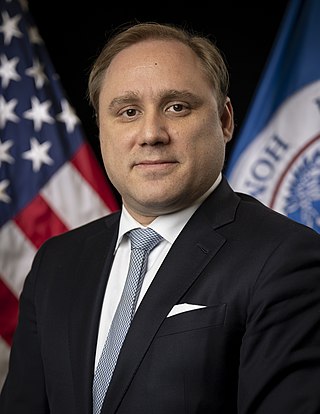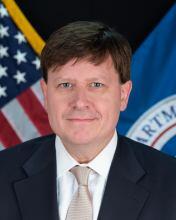Related Research Articles

The National Cyber Security Division (NCSD) is a division of the Office of Cyber Security &Communications,within the United States Department of Homeland Security's Cybersecurity and Infrastructure Security Agency. Formed from the Critical Infrastructure Assurance Office,the National Infrastructure Protection Center,the Federal Computer Incident Response Center,and the National Communications System,NCSD opened on June 6,2003. The NCSD mission is to collaborate with the private sector,government,military,and intelligence stakeholders to conduct risk assessments and mitigate vulnerabilities and threats to information technology assets and activities affecting the operation of the civilian government and private sector critical cyber infrastructures. NCSD also provides cyber threat and vulnerability analysis,early warning,and incident response assistance for public and private sector constituents. NCSD carries out the majority of DHS’responsibilities under the Comprehensive National Cybersecurity Initiative. The FY 2011 budget request for NCSD is $378.744 million and includes 342 federal positions. The current director of the NCSD is John Streufert,former chief information security officer (CISO) for the United States Department of State,who assumed the position in January 2012.

The Homeland Security Act (HSA) of 2002,was introduced in the aftermath of the September 11 attacks and subsequent mailings of anthrax spores. The HSA was cosponsored by 118 members of Congress. The act passed the U.S. Senate by a vote of 90–9,with one Senator not voting. It was signed into law by President George W. Bush in November 2002.
An information assurance vulnerability alert (IAVA) is an announcement of a computer application software or operating system vulnerability notification in the form of alerts,bulletins,and technical advisories identified by US-CERT,https://www.us-cert.gov/ US-CERT is managed by National Cybersecurity and Communications Integration Center (NCCIC),which is part of Cybersecurity and Infrastructure Security Agency (CISA),within the U.S. Department of Homeland Security (DHS). CISA,which includes the National Cybersecurity and Communications Integration Center (NCCIC) realigned its organizational structure in 2017,integrating like functions previously performed independently by the U.S. Computer Emergency Readiness Team (US-CERT) and the Industrial Control Systems Cyber Emergency Response Team (ICS-CERT). These selected vulnerabilities are the mandated baseline,or minimum configuration of all hosts residing on the GIG. US-CERT analyzes each vulnerability and determines if it is necessary or beneficial to the Department of Defense to release it as an IAVA. Implementation of IAVA policy will help ensure that DoD Components take appropriate mitigating actions against vulnerabilities to avoid serious compromises to DoD computer system assets that would potentially degrade mission performance.

Jeff Moss,also known as Dark Tangent,is an American hacker,computer and internet security expert who founded the Black Hat and DEF CON computer security conferences.

The Science and Technology Directorate (S&T) is a component within the United States Department of Homeland Security. DHS-S&T serves as the research and development arm of the Department as it fulfills its national security mission.
The EINSTEIN System is a network intrusion detection and prevention system that monitors the networks of US federal government departments and agencies. The system is developed and managed by the Cybersecurity and Infrastructure Security Agency in the United States Department of Homeland Security (DHS).
The National Cybersecurity Center (NCC) was founded in 2016 as a 501(c)(3) nonprofit organization in Colorado Springs,Colorado. It was started from a vision of then Governor John Hickenlooper,in coordination with several people from the University of Colorado Colorado Springs (UCCS) and the community. The NCC serves both public and private organizations and individuals through training,education,and research.
Phil Reitinger was the Deputy Under Secretary of the National Protection and Programs Directorate (NPPD) and Director of the National Cybersecurity Center (NCSC) at the United States Department of Homeland Security from 2009 to 2011. During that time,Reitinger led the department's integrated efforts to reduce risks across physical and cyber infrastructures and helping secure federal networks and systems by collecting,analyzing,integrating and sharing information among interagency partners.

The Director of the Cybersecurity and Infrastructure Security Agency is a high level civilian official in the United States Department of Homeland Security. The Director,as head of Cybersecurity and Infrastructure Security Agency at DHS,is the principal staff assistant and adviser to both the Secretary of Homeland Security and the Deputy Secretary of Homeland Security for all DHS programs designed to reduce the nation's risk to terrorism and natural disasters. The Director is appointed from civilian life by the President with the consent of the Senate to serve at the pleasure of the President.
The National Cybersecurity Alliance (NCA),is an American nonprofit 501(c)(3) organization which promotes cyber security awareness and education. The NCA works with various stakeholders across government,industry,and civil society,promoting partnerships between the federal government and technology corporations. NCA's primary federal partner is the Cybersecurity and Infrastructure Security Agency within the U.S. Department of Homeland Security.

Dmitri Alperovitch is an American think-tank founder,author,investor,philanthropist,podcast host and former computer security industry executive. He is the chairman of Silverado Policy Accelerator,a geopolitics think-tank in Washington,D.C.,and a co-founder and former chief technology officer of CrowdStrike. Alperovitch is a naturalized U.S. citizen born in Russia who came to the United States in 1994 with his family.

The Cyber Security Division (CSD) is a division of the Science and Technology Directorate (S&T Directorate) of the United States Department of Homeland Security (DHS). Within the Homeland Security Advanced Research Projects Agency,CSD develops technologies to enhance the security and resilience of the United States' critical information infrastructure from acts of terrorism. S&T supports DHS component operational and critical infrastructure protections,including the finance,energy,and public utility sectors,as well as the first responder community.

The Cybersecurity Information Sharing Act is a United States federal law designed to "improve cybersecurity in the United States through enhanced sharing of information about cybersecurity threats,and for other purposes". The law allows the sharing of Internet traffic information between the U.S. government and technology and manufacturing companies. The bill was introduced in the U.S. Senate on July 10,2014,and passed in the Senate on October 27,2015. Opponents question CISA's value,believing it will move responsibility from private businesses to the government,thereby increasing vulnerability of personal private information,as well as dispersing personal private information across seven government agencies,including the NSA and local police.
Code Dx,Inc. was an American software technology company active from 2015 to 2021. The company's flagship product,Code Dx,is a vulnerability management system that combines and correlates the results generated by a wide variety of static and dynamic testing tools. In 2021,the company was acquired by Synopsys.
The National Cybersecurity and Communications Integration Center (NCCIC) is part of the Cybersecurity Division of the Cybersecurity and Infrastructure Security Agency,an agency of the U.S. Department of Homeland Security. It acts to coordinate various aspects of the U.S. federal government's cybersecurity and cyberattack mitigation efforts through cooperation with civilian agencies,infrastructure operators,state and local governments,and international partners.
Election cybersecurity or election security refers to the protection of elections and voting infrastructure from cyberattack or cyber threat –including the tampering with or infiltration of voting machines and equipment,election office networks and practices,and voter registration databases.

The Cybersecurity and Infrastructure Security Agency (CISA) is a component of the United States Department of Homeland Security (DHS) responsible for cybersecurity and infrastructure protection across all levels of government,coordinating cybersecurity programs with U.S. states,and improving the government's cybersecurity protections against private and nation-state hackers.
Kathy J. Warden is an American business executive who has been chief executive officer (CEO) and president of Northrop Grumman since 2019.

Matthew Travis is a businessman and former American government official. He served as the Deputy Director for the Department of Homeland Security's Cybersecurity and Infrastructure Security Agency (CISA). Travis served as Deputy Under Secretary for the National Protection and Programs Directorate (NPPD) before the agency became CISA on November 16,2018.
Rinki Sethi is an American technology executive who has held Chief Information Security Officer and Vice President of Information Security roles at several large companies.
References
- ↑ "Government Matters". govmatters.tv. Retrieved 2018-03-28.
- ↑ "Dr. Phyllis Schneck | RSA Conference" . Retrieved 2018-03-28.
- ↑ Waterman, Shaun (2017-05-03). "Former DHS cybersecurity official Phyllis Schneck takes financial consulting job". Cyberscoop. Retrieved 2018-03-28.
- 1 2 3 4 5 "Phyllis Schneck". Department of Homeland Security. 2013-10-23. Retrieved 2018-03-28.
 This article incorporates text from this source, which is in the public domain .
This article incorporates text from this source, which is in the public domain . - ↑ Tuutti, Camille (2013-08-19). "DHS confirms Dr. Phyllis Schneck as deputy undersecretary of cyber - Fedscoop". Fedscoop. Retrieved 2018-03-28.
- ↑ Lohrmann, Dan (30 January 2016). "Transforming Cyber and Infrastructure Security: An Interview with the DHS Cyber Chief". www.govtech.com. Retrieved 2018-03-28.
- ↑ "Secure and Resilient Cyber Ecosystem Message Fabric Focus Group Meeting". secwww.jhuapl.edu. Retrieved 2018-03-28.
- 1 2 "Guest Lecture Dr. Phyllis A. Schneck". CHMPR. 2016-12-01. Retrieved 2018-03-28.
- ↑ Walker, Danielle (2013-12-02). "From private sector to government". SC Media US. Retrieved 2018-03-28.
- ↑ Schneck (2011). "STATEMENT OF DR. PHYLLIS SCHNECK, MCAFEE, INC. BEFORE: UNITED STATES SENATE JUDICIARY COMMITTEE SUBCOMMITTEE ON CRIME AND TERRORISM "CYBER SECURITY: RESPONDING TO THE THREAT OF CYBER CRIME AND TERRORISM" APRIL 12, 2011". www.judiciary.senate.gov. Retrieved 2018-03-28.
- ↑ "Northrop Grumman Appoints Phyllis Schneck as Vice President, Chief Information Security Officer" . Retrieved June 30, 2022.
- ↑ "McAfee's Phyllis Schneck, Ph.D., named Lattanze Executive of the Year - Newsroom - Loyola University Maryland". www.loyola.edu. Retrieved 2018-03-28.[ dead link ]
- ↑ "Articles by Phyllis A. Schneck". CSO Online. Retrieved 2018-03-28.
- ↑ "Woodrow Wilson Award 2016 | Johns Hopkins Alumni". alumni.jhu.edu. Retrieved 2018-03-28.